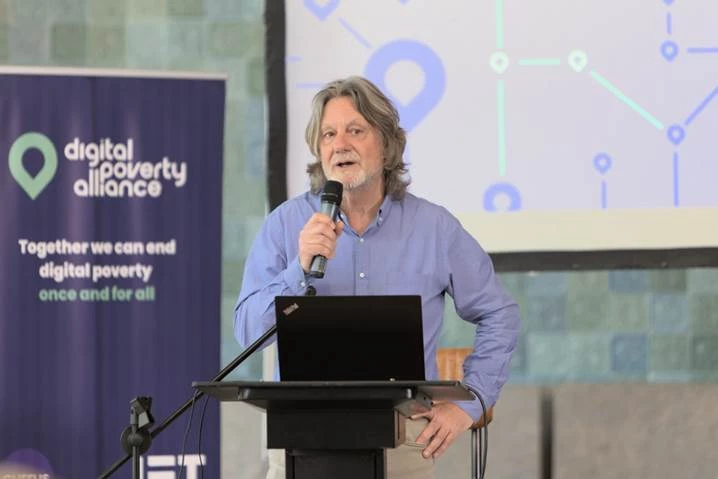
Digital poverty alliance launch national delivery plan in Leeds
The Digital Poverty Alliance has set out a landmark strategy to end digital poverty by 2030, launching its National Delivery Plan at a community event in Leeds.
The event set out the six core missions of the National Delivery Plan, including calls for a new digital inclusion strategy to raise awareness of digital poverty by the government, and calls for a new entitlement to provide affordable access to devices, connectivity and digital support.
The hybrid community event took place at the Leeds Central Library and virtually, featuring talks from the DPA’s CEO Paul Finnis, and head of policy and communications Tom Lowe, followed by a panel discussion and audience Q&A about the strategy.
Speaking at the event, Paul Finnis, CEO of the Digital Poverty Alliance and Learning Foundation, said: “A major aspect of the unique and revolutionary National Delivery Plan is the emphasis on support at a community level, assisting those in the areas hit hardest by a lack of access to critical digital services.
“In areas such as Leeds, joined-up digital inclusion support is essential to ensure that people are afforded access to devices, digital skills and online connectivity to carry out day-to-day essential tasks such as e-learning, job applications, online banking and digital healthcare.
“We recognise and have huge respect for the enormous effort and commitment of the 100 per cent Digital Leeds programme led by the digital inclusion team in the Integrated Digital Service (IDS) at Leeds City Council and Leeds Health and Care Partnership. Leeds leads the way in many ways in England and we also recognise the enormous success of the Digital Leeds Festival.
“To truly tackle and resolve the issue of digital exclusion requires a national communal effort from the government, industry and communities to support those most in need.
“The DPA and its alliance of organisations and individuals represented through its Community Board will continue to prioritise local communities as a central facet of the National Delivery Plan as part of this collaboration to ensure that everyone has access to the resources they need in our digital age.”
Research shows that around 1.7 million households in the UK (6 per cent) are without home internet access, while around 10 million adults (20 per cent) lack foundational essential digital skills. In Yorkshire & Humber specifically, 48 per cent of people said they cut back on at least one digital device in 2022, with 44 per cent saying cutting back on devices left them feeling socially isolated.
The National Delivery Plan sets out a roadmap to ensure that everyone receives the support they need through access to devices, skills and connectivity to benefit from the essentials of the digital world.
By Mark Adair – Correspondent, Bdaily
- Add me on LinkedIn and Twitter to keep up to date
- And follow Bdaily on Facebook, Twitter and LinkedIn
- Submit press releases to editor@bdaily.co.uk for consideration.
Looking to promote your product/service to SME businesses in your region? Find out how Bdaily can help →
Enjoy the read? Get Bdaily delivered.
Sign up to receive our popular Yorkshire & The Humber morning email for free.




 test article 123456789
test article 123456789
 hmcmh89cg45mh98-cg45hm89-
hmcmh89cg45mh98-cg45hm89-
 test456456456456456456
test456456456456456456
 test123123123123123123
test123123123123123123
 test xxxdiosphfjpodskhfiuodsh
test xxxdiosphfjpodskhfiuodsh
 Savour the flavour: North Tyneside Restaurant Week returns for 2024
Savour the flavour: North Tyneside Restaurant Week returns for 2024
 Six steps to finding the right buyer for your business
Six steps to finding the right buyer for your business
 Stephen signs off on a special night
Stephen signs off on a special night
 Life’s a Peachaus: Gillian Ridley Whittle
Life’s a Peachaus: Gillian Ridley Whittle
 Making a splash: Phil Groom
Making a splash: Phil Groom
 Making workplace wellbeing a priority
Making workplace wellbeing a priority
 A record of delivery, a promise of more: Ben Houchen
A record of delivery, a promise of more: Ben Houchen